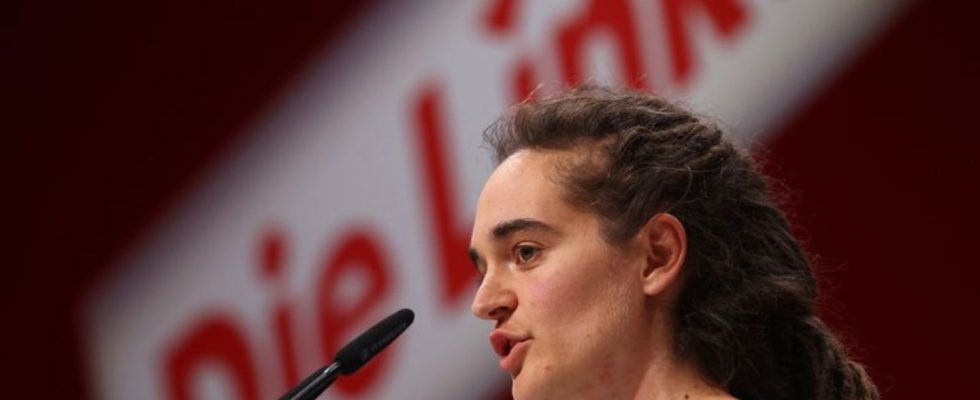parties
Without Wagenknecht, with racket: Left tries to restart
Together with Martin Schirdewan, Carola Rackete forms the top duo for next year’s European elections. photo
© Karl-Josef Hildenbrand/dpa
The party, which was plagued by crises and disputes, met in Augsburg for three days. At the end of the party conference, the focus will once again be on preparations for the 2024 European elections.
Left leader Martin Schirdewan was very satisfied on Sunday morning: the program for the European elections was adopted, a team of candidates was set up, the campaign to renew the party was started – and almost no one said their name at the Left party conference in Augsburg Sahra Wagenknecht would have mentioned. “No one here is interested in that anymore,” said Schirdewan. Then the 48-year-old rushed through the exhibition hall to the next live switch.
Almost four weeks after the break with its former icon Wagenknecht and shortly after the decision to dissolve its parliamentary group, the Left has sent a sign of life from the intensive care unit. Schirdewan was even confident in the Phoenix interview: “We will emerge from this process stronger.”
The more than 400 delegates were only too happy to believe that. They cheered on their European candidates, including Schirdewan himself, the former sea rescuer Carola Rackete and the Mainz doctor Gerhard Trabert. The comrades confirmed to each other that capitalism was not the end of history and that the left was needed more than ever.
However, it is uncertain whether and how the party will actually recover. The Berlin political scientist Klaus Schroeder was not impressed by Augsburg’s optimism. “The party is heading towards its end, it will soon be history,” Schroeder predicted on Deutschlandfunk.
What a comeback for the left
The party leadership is specifically recruiting young leftists in the climate movement or refugee aid and people who are disappointed with the SPD and the Greens. The chairmen Schirdewan and Janine Wissler now see a clear path for this after the spin-off from Wagenknecht. One factor is that the voting age will be 16 for the first time in the European elections in June 2024.
The former sea rescuer Rackete said on the sidelines of the party conference that the concept could work and that she was already sensing a lot of interest in the movements. The 35-year-old, who is running in the European elections with Schirdewan in the top duo, is herself a symbolic figure of this plan: she is not a member of the Left, the captain and ecologist stands for climate and refugee activism, and is admired in the party as an authentic person outside of politics .
Perhaps even more euphoria was caused in Augsburg by 67-year-old Trabert, also independent, the “doctor of the poor,” who was already a left-wing candidate for the office of Federal President. With an acclaimed speech against the stigmatization of supposedly “socially disadvantaged” people, Trabert achieved the best result of the party conference in the election for fourth place on the European list. The Left nominated a total of 20 candidates, although in 2019 there were only five seats with a vote share of 5.5 percent.
Everything together – social conscience, left-wing idealism and frustration with the traffic light parties – should be enough for a five percent share of the vote, that is probably the expectation of the left’s leadership. If this succeeds in the European elections, it could continue in the state elections in 2024 and the next federal election – and the 2025 plan for a comeback would have worked.
Wissler and Schirdewan are encouraged by the fact that since Wagenknecht left, 700 people have joined the party and far fewer have left. “Let us roll up our sleeves, straighten our backs, let us gather our courage and fight against all odds for a society based on solidarity,” Wissler shouted in her speech at the party conference.
What could get in the way of the left
However, the “adversities” mentioned by Wissler are diverse. On the one hand, Wagenknecht and her plans for a new party are attracting a lot of attention. The Left has been languishing in polls of 4 to 5 percent nationwide for months, while the Wagenknecht Party, which has not yet been founded, is at 12 to 14 percent – although not yet very reliable.
Wagenknecht, with her “little people” rhetoric, with a strict line against migration and watered-down climate protection, is apparently more in tune with the spirit of the times than the left with its plea for an unrestricted right to asylum, for feminism, class struggle and socialism. The Left affirms its commitment to the poor and workers and made a name for itself in Augsburg, for example, by demanding a statutory minimum wage of 15 euros. Many traditional voters, including in East Germany, still seem skeptical.
In practical terms, it is not just the announced dissolution of the left-wing faction in the Bundestag that is likely to deprive the party of political clout. There is another pitfall lurking: On December 19th, the Federal Constitutional Court will announce its ruling on the repeat of the 2021 federal election in Berlin. The horror scenario for the Left: The glitch election from back then has to be completely repeated and the party loses one of its two direct mandates in Berlin.
The Left missed the five percent hurdle in 2021 and only got into parliament with 39 MPs via a special clause due to winning three direct mandates. According to current legal opinion, if a direct mandate is lost, the 36 MPs who benefited from the basic mandate clause also lose their seats. By the way, Sahra Wagenknecht is among them.

